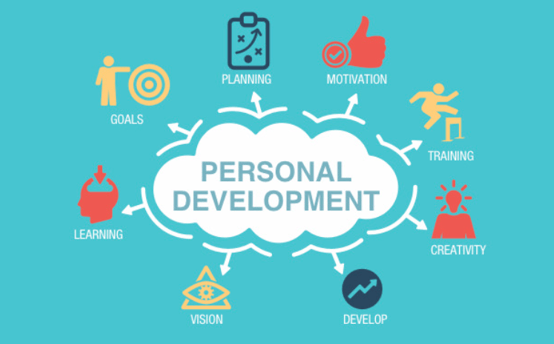Personal Development
Personal development is a journey, not a destination. You don’t have to do everything at once. Start small, stay consistent and celebrate your progress.
2/6/20253 min read


Personal Development -
Personal development is all about improving yourself, your mindset, habits and skills, to live a happier, more successful life. It’s a journey that never ends and even small efforts can bring big results.
Think of it like upgrading a mobile app. If you keep updating it, it runs smoother and offers better features. But if you ignore updates, it slows down and becomes less useful. The same happens with us, when we work on ourselves, we grow.
Why Personal Development Matters
Personal development isn’t just about success; it also helps in:
✅ Becoming more confident
✅ Achieving personal and professional goals
✅ Reducing stress and improving mental health
✅ Building strong relationships
✅ Feeling more fulfilled in life
Now, let’s explore some simple yet powerful ways to work on personal development.
1. Read and Learn Every Day
Learning is the key to growth. You don’t need to read a 500-page book in a day; even 10 minutes of reading or watching educational videos can help.
➡ Example: Sarah wanted to improve her communication skills. She started reading books on communication and practicing in front of the mirror. Slowly, she became more confident in conversations.
Ways to Learn:
Read self-improvement books
Listen to podcasts or audiobooks
Watch TED Talks or educational YouTube videos
Take online courses on skills that interest you
2. Set SMART Goals
Goals give you direction in life. But if they are too vague, you may feel lost. That’s why SMART goals are effective:
S – Specific (What exactly do you want?)
M – Measurable (How will you track progress?)
A – Achievable (Is it realistic?)
R – Relevant (Does it align with your values?)
T – Time-bound (When do you want to achieve it?)
➡ Example: Instead of saying, “I want to be healthy,” say, “I will exercise for 20 minutes, five times a week, for the next three months.”
3. Improve Your Mindset
Your mindset shapes your life. If you believe in yourself, you’re more likely to take action and succeed.
Fixed mindset: “I’m not good at this, so I won’t even try.”
Growth mindset: “I can learn this with practice and effort.”
➡ Example: Tom was afraid of public speaking. Instead of avoiding it, he started practicing small speeches in front of his friends. With time, he improved and gained confidence.
Tips to Develop a Growth Mindset:
✔ Replace negative thoughts with positive ones
✔ Accept failures as learning experiences
✔ Celebrate small improvements
4. Build Better Habits
Success isn’t about making big changes overnight. It’s about small daily habits that lead to long-term results.
➡ Example: If you want to read more, start with 5 minutes a day instead of trying to finish an entire book in one sitting.
Good habits to develop:
✅ Wake up early and plan your day
✅ Exercise regularly (even a short walk helps)
✅ Practice mindfulness or meditation
✅ Drink enough water and eat healthy
✅ Limit social media and focus on productive activities
5. Surround Yourself with the Right People
The people you spend time with influence your thoughts and actions. Stay around those who uplift and inspire you.
➡ Example: Jake wanted to start a business but was surrounded by negative people who doubted him. When he joined an entrepreneur’s group, he got the motivation and support he needed to start.
How to Build a Positive Circle:
Join communities related to your interests
Connect with mentors and like-minded people
Distance yourself from negativity
6. Practice Gratitude Daily
Gratitude helps shift your focus from problems to blessings. It makes you happier and more positive.
➡ Example: Emily used to complain about work stress. When she started writing three things she was grateful for each day, she felt more content and less stressed.
How to Practice Gratitude:
✔ Keep a gratitude journal
✔ Say “thank you” more often
✔ Reflect on good moments before sleeping
7. Manage Your Time Wisely
Time is your most valuable resource. Managing it well increases productivity and reduces stress.
➡ Example: John always felt overwhelmed with work. When he started using a planner and prioritizing tasks, he became more efficient and less stressed.
Time Management Tips:
Make a to-do list daily
Use the Pomodoro Technique (work for 25 minutes, then take a 5-minute break)
Avoid multitasking—focus on one task at a time
Set deadlines to stay accountable
8. Step Out of Your Comfort Zone
Growth happens when you challenge yourself. Trying new things builds confidence and skills.
➡ Example: Lisa was afraid of networking. But when she pushed herself to attend events and talk to new people, she built strong connections that helped her career.
Ways to Step Out of Your Comfort Zone:
✔ Try a new hobby or skill
✔ Speak up in meetings or social gatherings
✔ Travel to a new place alone
✔ Take on a challenge that scares you
9. Take Care of Your Mental and Physical Health
Your body and mind need care to function at their best.
➡ Example: Mark was always exhausted. When he started exercising and getting 7–8 hours of sleep, he felt more energetic and focused.
Ways to Stay Healthy:
Exercise at least 30 minutes a day
Eat nutritious foods
Sleep 7–9 hours every night
Practice meditation or deep breathing to reduce stress
10. Self-Reflection and Journaling
Self-reflection helps you understand your thoughts, emotions and progress.
➡ Example: Mia writes in her journal every night about what she learned and how she felt. This helps her stay focused on her growth.
How to Practice Self-Reflection:
✔ Write about your daily experiences and lessons
✔ Ask yourself: What went well today? What can I improve?
✔ Meditate to understand your thoughts better
Health and Fitness
Health and fitness is a journey of balanced nutrition, regular exercise, and mindful well-being for a vibrant life..
Yoga
Meditation
contact@trustislife.com
© 2024. All rights reserved.
